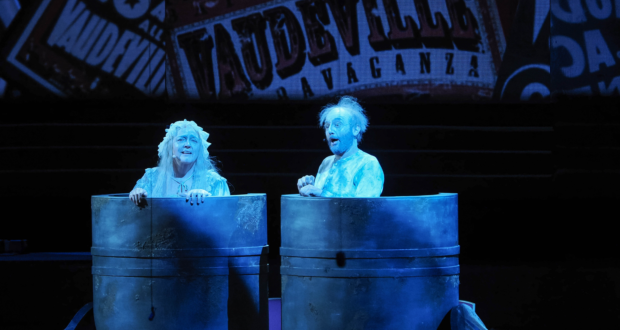Beckett meets his match in an excellent revival of Kurtág's masterpiece.Summary
Rating
Excellent
Hungarian composer György Kurtág saw Samuel Beckett’s Endgame on stage in Paris on its French debut in 1957. Beckett’s texts are challenging and resist interpretation, so there could never have been any better composer to set his work than a member of the Hungarian avant garde, and over 60 years of creative gestation created an excellently appropriate soundscape of despair and existential loathing. Kurtág’s adaptation was first performed at La Scala, Milan in 2018 as ‘Fin de partie’, having skipped around various European houses during commission, and was canonised immediately as one of the greatest operas of this century.
Given a semi-staging for the Proms by director Victoria Newlyn and conductor Ryan Wigglesworth, the piece is run altogether, rather than presented in scenes as per its previous incarnations (sung in French with English surtitles). It makes for a long night with no relief. I’m sure Beckett would have been proud. The action is only ever to sit, be in a bin or to hobble here and there, so a concert semi-staging feels appropriate and preferred.
The fragmentary, but not atonal, score is tackled with confidence and is clear and accurate. The result under Wigglesworth’s direction feels perfect. Despite its challenge to both audience and conductor, it is made listenable through exploring the depth of the slow narrative progression throughout. Wigglesworth does not rush to dramatic relief but allows tension to build throughout. He makes the most of the composer’s cheap trick ending, allowing the fanfare of brass, whistles and tambourine that heralds our departure to blast in abundance, giving us something to try to whistle all the way home.
Our protagonists, master Hamm and servant Clov are the vile cockroaches left at the end of the world. Frode Olsen, who has sung Hamm in every incarnation, sings a vile, ill-natured toad. He tackles the changes in register with a repugnant swallow in his voice and it’s affecting in all the right ways. Horrible. He is bang on and incredibly forceful, not a note is wasted. It is worth catching up on BBC Sounds for Scene 4: Hamm’s first monologue alone, if you’re looking for a bad time.
In contrast, Morgan Moody plays a strong and beautiful Clov with a clean heart and unbothered conscience, little concerned by his master’s repugnant self-interest. The result is more as if Mozart’s Leporello found himself in a seedy back alley; no existential dread and angst. It’s an odd choice but at least it’s sung well. Likewise, Nell (Hilary Summers) is content in his bin.
The opera begins with a prologue, Beckett’s poem Roundelay, sung in English by our Nagg, Leonardo Cortellazzi. Another veteran of this piece, he sets the mood for the evening perfectly as the character runs up and down broken chords as if tuning the evening. Cortellazzi and Olsen’s broken gothic tones are the perfect pairing that never happens. A duet we’d kill for, but Beckett won’t let us have.
Conducted by: Ryan Wigglesworth
Produced by: BBC Proms
György Kurtág’s Endgame played for one performance only. It is available on BBC Sounds for one month here.
 Everything Theatre Reviews, interviews and news for theatre lovers, London and beyond
Everything Theatre Reviews, interviews and news for theatre lovers, London and beyond



